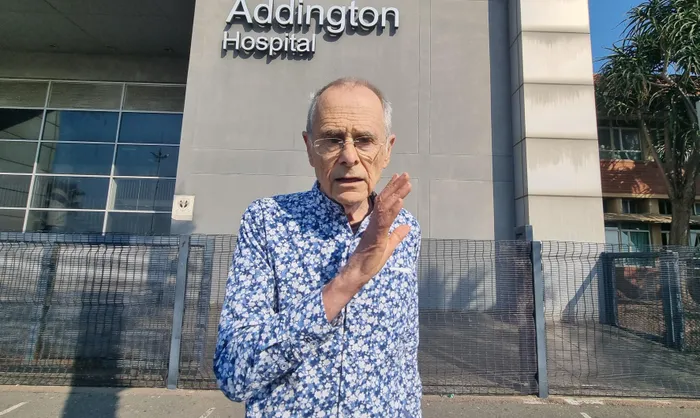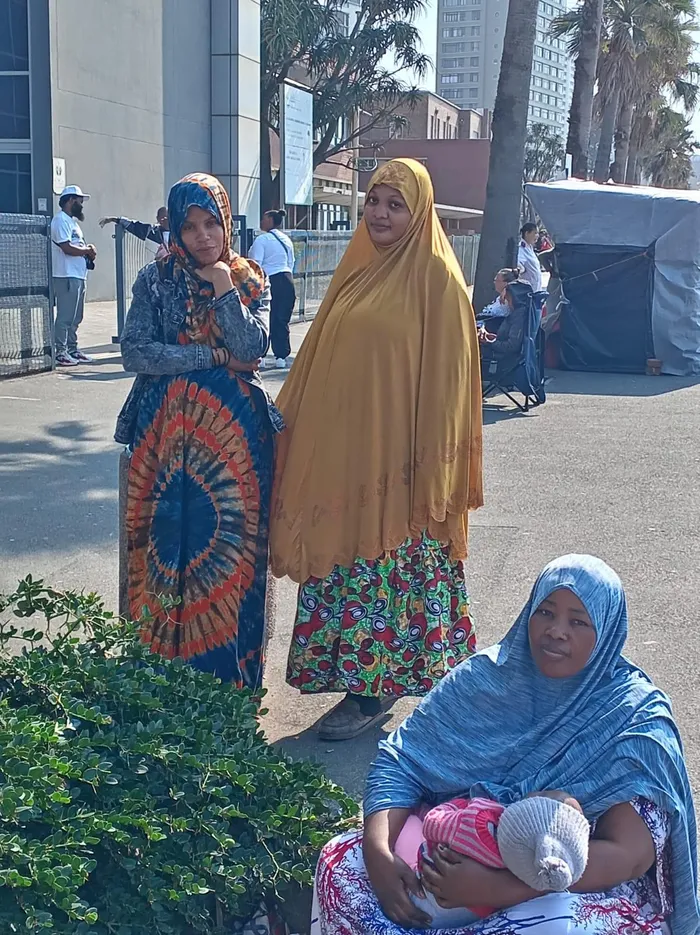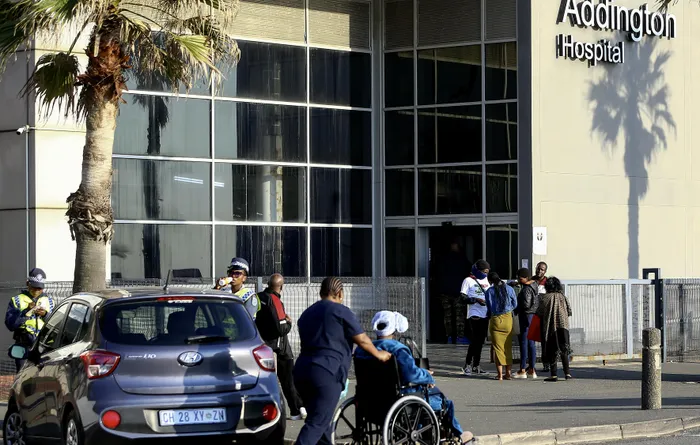Hospitals first, schools next: Inside South Africa’s growing anti-foreigner movement

Crispin Hemson the South African who was assaulted by March and March outside Addington Hopsital on Thursday.
Image: Tumi Pakkies / Independent Newspapers
Hospitals today, schools and spaza shops are next.
That's the warning from a group of illegal enforcers determined to drive foreigners out of the country.
As anti-foreigner sentiment sweeps across Durban and Johannesburg, they've warned that their campaign will reach other provinces as well.
For the past six weeks, the group known as March and March has been stationed outside Addington Hospital, blocking access to anyone they suspect is not South African. Those who are must provide an ID before they can enter the facility, and even then, it’s subject to the group’s discretion, the Independent on Saturday was told this week.
Teresa Nortje, the group’s KZN representative, claims foreigners are overburdening public facilities meant for local citizens. She says their “research,” conducted while blocking entrances, shows that at least 75% of patients receiving treatment at Addington are in the country illegally. Refugees and asylum seekers are also turned away, while foreigners who are legally in South Africa, she says, must access private health care facilities.
“All foreign nationals are being stopped here until the government comes out and fixes the Constitution. It says everyone can get medical help at this hospital, but ‘everyone’ should mean South African citizens. If you're a foreigner, go to a private hospital. You’ve got work permits, visas, medical insurance. You shouldn’t come here with nothing, no job, and expect us, the taxpayers, to pay for your medicine.”

Johari Hassani, Aisha Manirakiza and Amida Juma (seated) from Burundi were refused access to Addington Hospital by March and March, a group of people from various organisations who want foreigners to leave the country.
Image: Wendy Jasson da Costa
Nortje says their group includes members of Operation Dudula, a prominent anti-foreigner movement, and that they also enjoy support from what she calls “progressive forces,” including various organisations and political parties.
March and March begins its first shift at Addington Hospital at 5am every morning and remains there throughout the day. Nortje says some foreigners arrive at 3am hoping it will get them in without interference, but they are also blocked. She insists the group is not completely unreasonable.
“There was a lady who was nine months pregnant. She was about to give birth and we never denied her access. Her husband refused to show his identification, so we didn’t let him enter.”
She says undocumented foreigners are also prevented from visiting patients in the hospital because they “assume” that these patients are also “illegal".
“We need immigration to come and intervene. Once they get their treatment here in the hospital, they need to either be deported or to be removed to a private institution,” said Nortje.
She claims many people were turned away because they had “fake” South African documents or fake documents claiming they are refugees or asylum seekers.
“So we ask for the last three digits of your ID, because the ID numbers of a South African are completely different from that of a foreigner. And then if you're a Zulu, we ask for your clan name.”
Next week, another group from March and March will begin their “gatekeeping” at RK Khan Hospital in Chatsworth, before moving to Mahatma Gandhi in Phoenix - continuing until, Nortje says, “all public health facilities are monitored.”

Masked anti-immigrant campaigners turn away people seeking assistance at Durban’s Addington Hospital yesterday while the city’s Metro Police ticket cars, oblivious to what is going on around them.
Image: Leon Lestrade Independent Newspapers
“These undocumented foreigners create big problems in our country and we are tired now.
“We are doing this for our South African brothers and sisters because they are suffering. So we want to make a stand, and we want to get this message out to the people of South Africa to realise we are not here to create xenophobia as they say we are doing.”
South Africa has a history of xenophobic violence, and previously, foreigners had to flee their homes and leave their businesses when locals attacked them.
Nortje says they have an “agreement” with the SAPS and Metro Police, which doesn't interfere with them as long as they are only a handful of people.
“For now, it's the hospitals, but we are going to be expanding our campaign. “We are definitely going to be checking spaza shops, we are going to go to schools because 95% of children are illegal foreigners,” she warned.
She claims that since they started their campaign at the hospital, South Africans have been able to get their medication and other treatments quicker than before, and the hospital's staff are also happier because they are not overburdened.
On Thursday, tensions boiled over when the group assaulted a South African man, Crispin Hemson, who Nortje claims tried to collect medication for those barred from entering Addington.
Hemson had, in fact, arrived for a physiotherapy appointment. He had to fetch the police to accompany him to the hospital and persuade the illegal enforcers to allow him entry.
“The problem is that many South Africans are also deprived of healthcare, not just foreigners,” he said. “I was an anti-apartheid activist and it seems I am compelled to go back to that role.”
Hemson says he spoke to one of the hospital managers, who told him the hospital’s responsibility ends at the fence.
Following the altercation, he was accompanied by several foreigners to the Point Police Station, where he tried to open a case of assault, but was not allowed to.
“The police at Point told me they would only take action if the Minister of Police told them what to do. They did not allow me to lay a charge of assault,” said Hemson.
He warned that the situation could escalate dangerously.
“I recall how the situation [xenophobia] in 2021 started with exactly this kind of pernicious attack on people, and I'm very aware of the consequences that can flow, including major disruption to lives and the economy.”
Nathi Olifant from the KZN Department of Health warned that preventing foreigners from accessing healthcare could undermine efforts to detect, control and treat infectious diseases which may spread rapidly in communities.
“It's not the Department of Health that should check the status of whether people are illegal or not. It's Home Affairs and SAPS. We treat everyone coming into our facilities,” he said.
Last week, the department said it was unconstitutional to prevent anyone from accessing healthcare, and condemned “in the strongest possible terms” those who take the law into their own hands.
“At the same time, we unequivocally condemn undocumented foreign nationals who unlawfully cross into South Africa with the sole intention of unduly accessing our public health services. While our health institutions remain committed to upholding basic human rights and ethical healthcare standards, the increasing and unauthorised influx of undocumented individuals continues to place significant pressure on our already strained and underfunded public health system.”
On Thursday, the Independent on Saturday spoke to a group of dejected women who had been prevented from entering Addington Hospital. They were all from Burundi. They were all scared.
Johari Hassani who is six months pregnant is scared that she might have complications after undergoing major surgery just two months before she became pregnant. She’s been trying to get to her doctor for weeks, but March and March keep turning her away.
Tears ran down her face as she recalled the doctor’s advice for regular checkups.
“I know I’m sick but I don't have money to go to a private doctor. I'm scared,” she whispered.
Her husband is a barber and the only breadwinner. When possible, Hassani sells chapatis, tea, and magwinya for extra cash, because they also send money home to her mother and siblings in Burundi.
Aisha Manirakiza says it takes nearly two weeks by bus to reach Burundi and she would need about R15 000 to get her whole family there.
“I’m scared. I want to go back.”
A despondent mother, Amida Juma, sat on the pavement outside Addington feeding her eight-month-old daughter. Her child had been sick all night. Without access to the hospital, there was no other way to get medical help without money. All three women said they fled conflict and unemployment in Burundi. They were prepared to work hard in South Africa, but never expected all the other obstacles.
Meanwhile, Abahlali baseMjondolo, the shack dwellers’ movement, has warned against the “xenophobia and fascist politics” pushed by Operation Dudula.
Last week, the organisation marched to the offices of the Socio-Economic Rights Institute of South Africa (SERI) but Abahlali and other civil rights organisations formed a human barrier to keep them out. The group alleges it has since received several death threats.
“People making such public death threats must be exposed and held accountable. If we come under attack and it is necessary for us to engage in self-defence, we shall do so,” it said in a statement.
It also warned that xenophobia could spread rapidly.
“There is mass unemployment, mass impoverishment, and rapidly declining public services and institutions. People are desperate, and if the only explanation they are given for their suffering is one that scapegoats migrants - rather than explaining the real forces that have made people poor and that keep people poor, as well as the real reasons for the collapse of government services and institutions - there is a danger that xenophobic and fascist politics could spread.”
Police have not yet commented on the issue.
What the law says
The Legal Position: KZN Health Department says that foreigners are entitled to public health care.
Constitutional Right: Section 27 of the South African Constitution guarantees that everyone has the right to access healthcare services, including reproductive healthcare, and that no one may be refused emergency medical treatment.
National Health Act: This Act ensures access to primary healthcare services for all individuals in South Africa, regardless of immigration status.
Refugees Act: This Act protects the rights of refugees and asylum seekers to healthcare services, and prohibits denial of emergency medical care.
Immigration Act: While healthcare facilities are permitted to inquire about legal status, this should not hinder the provision of necessary care, especially in emergencies.
Independent on Saturday